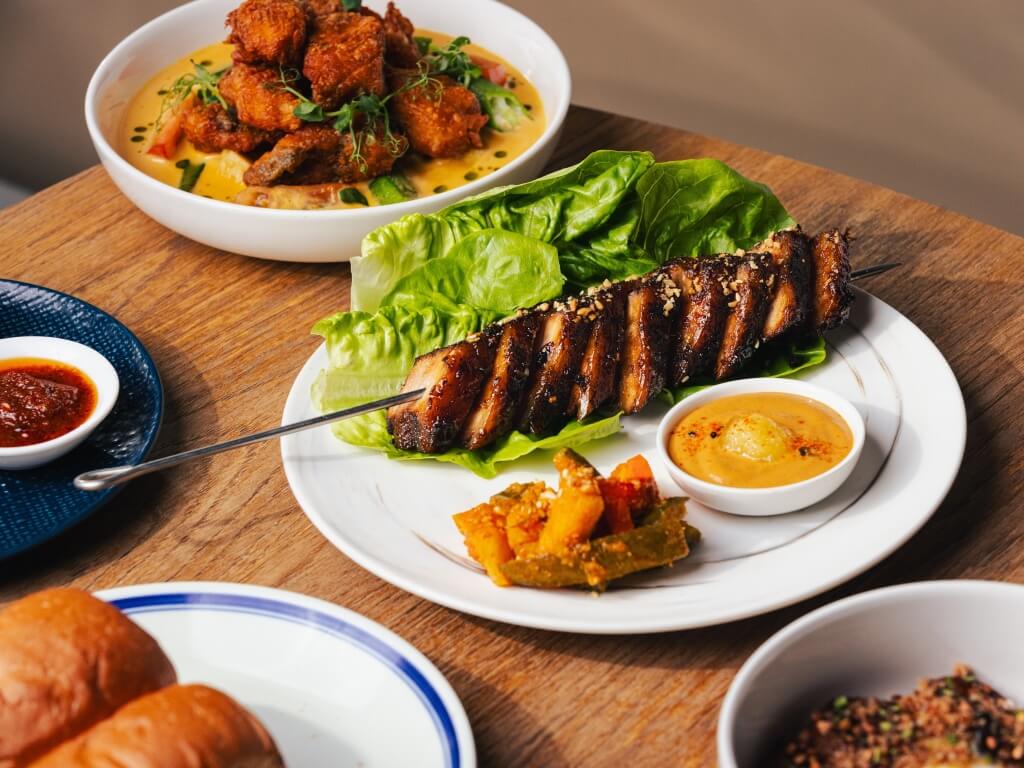Nutmeg & Clove celebrates its tenth year with a new look across its food, drinks and crew

Even if you’re not an imbiber of cocktails, chances are you would have still heard of Nutmeg & Clove, which sits along the row of heritage shophouses on Purvis Street.
The restaurant-bar, which currently ranks 7th on the Asia’s 50 Best Bars list, is due to celebrate its tenth year in May. With the festivities come a whole new look — menu, logo, interior, and even its crew’s uniforms.

In line with this milestone is its new menu, aptly called “Ten” and features a list of 25 cocktails (S$25 each) engineered by its head bartender Gavin Teravasan.
Some of these cocktails are brand-new creations (15 out of 25 are new, to be exact) while others are the bar’s classics, revisited.
Within its refreshed menu, Nutmeg & Clove recounts Singapore’s and the bar’s own milestones over the past decade, highlighting events such as Joseph Schooling’s 2016 Olympic gold win and the bar’s inaugural entry into the World’s 50 Best Bars list that same year.
Each of these moments link back to a particular drink within the menu, so choosing your cocktail becomes something of a choose-your-own-adventure journey.
Beyond its drinks line-up, Nutmeg & Clove has also brought on a new head chef, Bernstein Lim, whose background spans trendy F&B spots like Rebel Rebel Wine Bar and Park Bench Deli, to spearhead the food programme for venues under the Nutmeg Collective umbrella.
Fans of Nutmeg & Clove’s previous dishes, take heart — favourites like its rendang mac & cheese (S$18) and mala sweet potato fries (S$14) are still on the menu.

But you’ll also find new Asian-inspired dishes you probably wouldn’t expect to see in a bar, such as abacus seed (S$20), babi kicap skewer (confit pork belly with kicap manis glaze, S$24) and kaya creme toast (S$13).
“The tenth year marks a significant milestone for us, so we decided to rejuvenate the brand. It’s now more modern and strengthens our identity as a cocktail bar that tells stories of Singapore,’ says Shelley Tai, Nutmeg Collective’s group director.
Highlights from Nutmeg & Clove’s new menu
With so many new introductions to its menu, it was hard to pick our standouts. But if we absolutely had to, its Yam Seng (S$25) cocktail stole the show.

Ask any bartender and the Ramos gin fizz gets the worst rep for being one of the most labour-intensive drinks to make. It owes this notoriety to how much one has to shake the concoction to achieve the right silky-smooth, yet creamy consistency.
Nonetheless, Nutmeg & Clove doesn’t shy away from this — it’s always had a drink in this style on the menu since 2014 — and thankfully, it does this particular iteration beautifully.

True to its punny name, the yam is prominent, but nicely complemented by the mild pandan and lemongrass additions.
Even though it’s a creamy drink, these ingredients, when combined with its mezcal base, felt incredibly light on the palate. (Regrettably, this dairy-intolerant writer still had to call it quits halfway through.)

Another one of the books is the Agnes’ Requiem (S$25) — named after Agnes Joaquim, the first woman to breed a hybrid orchid — a classy gin-based drink with an edible orchid garnish.
It’s equal parts floral and fruity, thanks to the accompanying raspberry liquor, rhubarb and jasmine — it’s great for anyone who likes a light, mildly sweet drink.
Being part-Hakka, I loved Nutmeg & Clove’s introduction of abacus seed to the food menu, though I have to admit the usual minced pork and dried prawns were sorely missed in this vegetarian version.

Chef’s Berstein’s take, however, includes an onsen egg. This unusual addition defies tradition but makes up for the missing umami elements. And if it means making this delicious, traditional snack more accessible to vegetarian diners, I’m all for it.
The kaya creme toast was also a welcome finish to the meal.

Since it comes with a good dollop of kaya creme, you might expect the dessert to be too cloying, but the sprinkle of mint leaves helps cut through all of that and I found myself wishing there was more to go around.
With plenty of time leading up to Nutmeg’s actual tenth birthday in May, the bar still has many guest shifts planned in the coming weeks — Jakarta’s The Cocktail Club is shaking things up on Mar 5 and Taipei’s The Public House will be there on Mar 11 — culminating in a grand week-long bash starting May 26.
For the exact guest shift rundown, you’ll just have to stay tuned to the bar’s socials.
This was a hosted tasting.
Hungry for more? Check out our latest stories on a bartending couple rocking up the local night scene and the top places for pasta in Singapore.
Do explore the GrabFood Dine-in service for awesome deals.
Alternatively, book a ride to these places for pasta in Singapore.
Nutmeg & Clove
8 Purvis Street
Nearest MRT: Bras Basah, Bugis
Open: Monday to Thursday (5pm to midnight), Friday and Saturday (4pm to midnight)
8 Purvis Street
Nearest MRT: Bras Basah, Bugis
Open: Monday to Thursday (5pm to midnight), Friday and Saturday (4pm to midnight)







